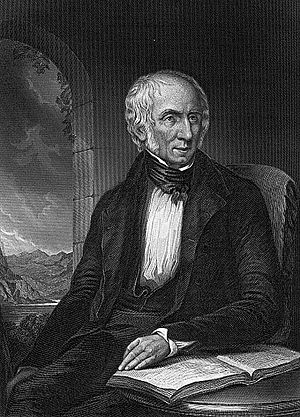William Wordsworth
 From Conservapedia - Reading time: 2 min
From Conservapedia - Reading time: 2 min
William Wordsworth (Cockermouth April 7, 1770 – Rydal Mount April 23, 1850) was a poet who founded English Romanticism. He was born in 1770 -- the same year of birth as Beethoven, Hegel, and Hölderlin -- in Cockermouth, Cumberland, in the English Lake District. William's mother died when he was eight, and his father died when he was fourteen. Wordsworth first attended Hawkshead Grammar School in Westmorland, a boarding school that emphasized the teaching of mathematics and classics. He later attended Cambridge University, spending four months in 1790 on a walking tour across Europe. While in France, he became a fervent republican sympathizer, famously exclaiming of the early days of the Revolution: "Bliss was it in that dawn to be alive, / But to be young was very Heaven!" (The Prelude [1805] XII.108-09).
His poems are all in the public domain and are accessible on the internet, such as "I wandered lonely as a cloud":[1]
I wandered lonely as a cloud
That floats on high o'er vales and hills,
When all at once I saw a crowd,
A host, of golden daffodils;
Beside the lake, beneath the trees,
Fluttering and dancing in the breeze.
Continuous as the stars that shine
And twinkle on the milky way,
They stretched in never-ending line
Along the margin of a bay:
Ten thousand saw I at a glance,
Tossing their heads in sprightly dance.
The waves beside them danced; but they
Out-did the sparkling waves in glee:
A poet could not but be gay,
In such a jocund company:
I gazed---and gazed---but little thought
What wealth the show to me had brought:
For oft, when on my couch I lie
In vacant or in pensive mood,
They flash upon that inward eye
Which is the bliss of solitude;
And then my heart with pleasure fills,
And dances with the daffodils.
Wordsworth published his first works of poetry in 1793, including "Descriptive Sketches" and "An Evening Walk". He would later publish, with the help of his friend Samuel Taylor Coleridge, the Lyrical Ballads. In the preface to the Lyrical Ballads, Wordsworth declared that the book's object was "to choose incidents and situations from common life and to relate or describe them... in a selection of language really used by men, tracing in them the primary laws of our nature."
Further reading[edit]
- Kevin M. Saylor. "Wordsworth's Prudent Conservatism: Social Reform in the Lyrical Ballads," Modern Age — Volume 43, Number 2; Spring 2001 online edition
- G. Singh. "F.R. Leavis on Wordsworth," Modern Age Volume 43, Number 3; Summer 2001 online edition
See also[edit]
- William Blake
- George Gordon, Lord Byron
- Samuel Taylor Coleridge
- John Keats
- Percy Bysshe Shelley
- Literature
 KSF
KSF